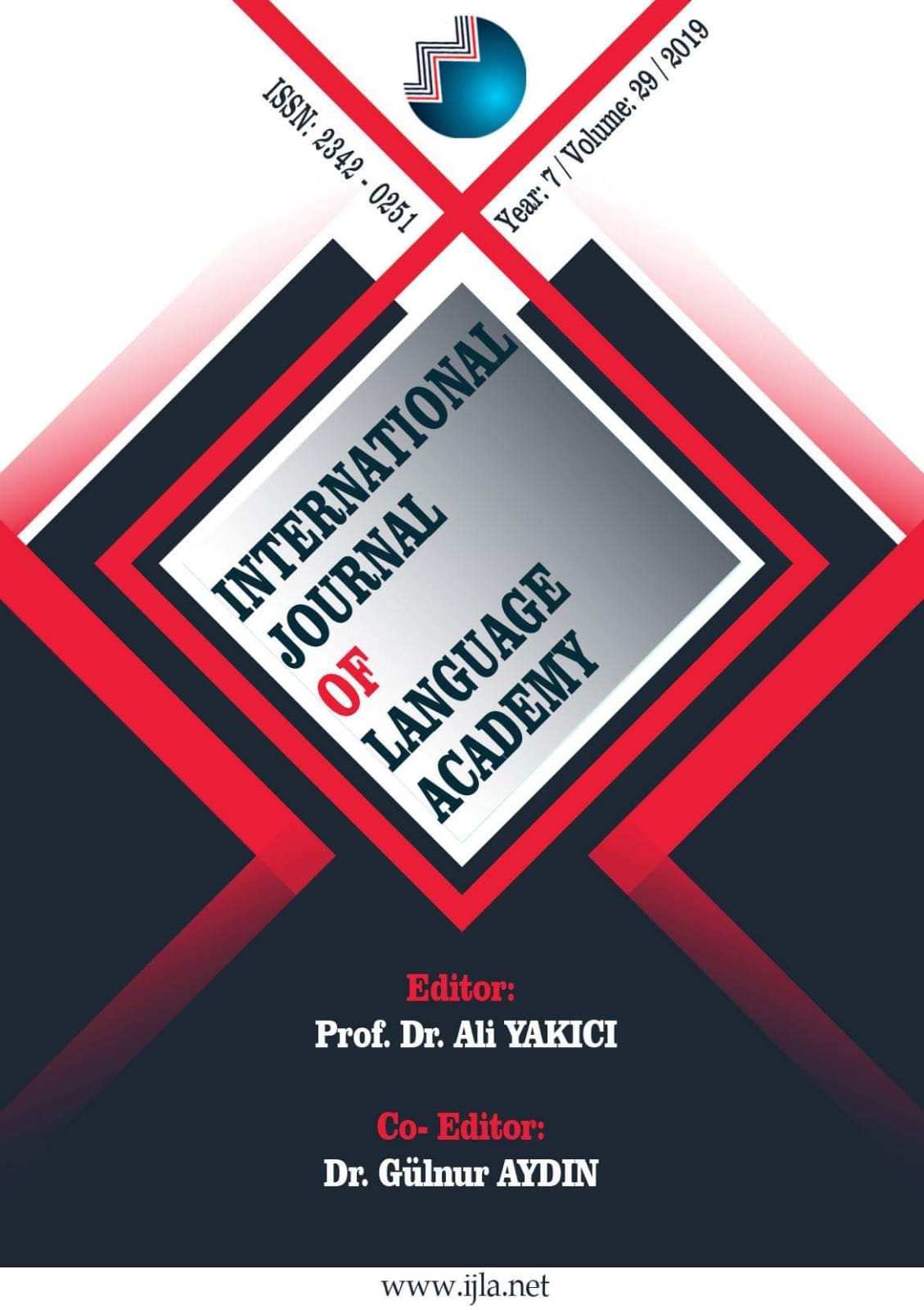Yabancı Dil Olarak Türkçe Öğretiminde Kullanılan Ders Kitaplarındaki Okuma Metinlerinde Atasözü Ve Deyimlerin Dağılımı: Yedi İklim Örneği
Author :
Abstract
Sıklık çalışmaları yabancı dil olarak Türkçe öğretiminde üzerinde durulması gereken önemli konulardan biridir. Türkçe Sözlükte, sıklık “sık olma durumu, sık geçme, kullanımı sık olma” şeklinde geçmektedir. Yabancı dil öğretiminde hangi kelimelerin öğretileceğinin tespit edilmesinde sıklık analiz çalışmalarına ihtiyaç duyulmaktadır. Sağlıklı bir dil öğretiminin gerçekleşebilmesi için öğretilmesi hedeflenen kelimelerin tespit edilmesi gerekmektedir. Öğretilmesi hedeflenen kelimelerin rastgele belirlenmesi, seviyelere uygunluğunun göz önünde bulundurulmaması ve dildeki bütün kelimelerin öğretilmeye çalışılması gibi hatalar dil öğretimini güçleştirecektir. Yabancılara Türkçe öğretmek için kullanılan ders kitaplarında atasözleri ve deyimler önemli yer tutar. Öyle ki kitaplarda kullanılan metinlerin neredeyse tümünde deyimlere rastlamamız mümkündür. Bu durum dil öğretiminde kültür aktarımının öneminden ileri gelmektedir. Dil öğretimi kültür öğretiminden ayrı düşünülemez. Hazırlanan ders kitaplarında deyim ve atasözü öğretimiyle ilgili çeşitli sorunlar bulunmaktadır. Bu sorunların temel sebebi, dil öğretiminde atasözü ve deyimlerden ne ölçüde yararlanılması gerektiği ve hangi seviyede hangi deyim ve atasözünün öğretilmesi gerektiğiyle ilgili bir ölçütün bulunmamasıdır. Bu nedenle kelime sıklık çalışmaları önem arz etmektedir. Araştırmada deyimlerin ve atasözlerinin sıklıklarının tespit edilebilmesi için, Yunus Emre Enstitüsü’nün hazırlamış olduğu Yedi İklim Türkçe Öğretim Seti incelenmiştir. A1, A2, B1, B2 ve C1 ders kitaplarında geçen deyim ve atasözleri metin tarama yöntemi kullanılarak tespit edilmiş ve tablolarla gösterilmiştir. Ayrıca söz konusu materyallerde geçen deyim ve atasözü alıştırmaları örnek şekillerle ifade edilip TDK’ye uygunluğuyla ilgili değerlendirmelerde bulunulmuştur.
Keywords
Abstract
Frequency studies are one of the important issues to be emphasized in teaching Turkish as a foreign language. In the Turkish Dictionary, frequency refers to "beingf requent, frequent, frequentuse". Frequency analysis studies are needed when determining which words should be taught in foreign language teaching. In orderfor a healthy language teaching to be realized, the words targeted to be taught must be identified. Teaching mistakes, such as randomization of targetwords, ignoring suitability of levels, and attempting to teach all the words on the ground will make language teaching difficult. Proverbs and idiom stake an importantplace in textbooks used to teach Turkish to foreigners. It is possible that we can encounter almost all the texts used in the books. This is due to the importance of culture transfer in language teaching. Language teaching can not be considered apart from cultural teaching. In the text boks prepared, there are various problems related to teaching idioms and proverbs. The main reason for these problems is that there is nomeasure about the extent to which the proverb and phrases should be used in language teaching and which idiom and proverb must be taught at which level. For this reason, word frequency studies are important. In order to determine the frequencies of the idioms andproverbs in the survey, the Yedi İklim Türkçe Öğretim Seti, prepared by the Yunus Emre Institute, has been examined. The idioms and proverbs used in A1, A2, B1, B2 and C1 text boks have been determined using texts can ningmethods and are shown on tables. In addition, the idiom and proverbial practices in the materials were expressed in the form of examples and related evaluations were made regarding compliance with TDK.
Keywords
- Aksan, D. (2009) Her Yönüyle Dil, TDK Yayınları, Ankara.
- Aksan, D. (2000). Her Yönüyle Dil: Ana Çizgileriyle Dilbilim. Ankara: Türk Dil Kurumu
- Atagül, Yılmaz, Y. (2015). Yabancı Dil Olarak Türkçe Öğretiminde Atasözü ve Deyimlerin Sıklık Analizi. Turkish Studies. 10.7. 1021-1037
- Bulut, M. (2013). Türkçe Eğitimi ve Öğretiminde Dil ve Kültür Aktarımı Aracı Olarak Atasözü ve Deyimlerin Önemi. Turkish Studies.8.13.564
- Dinçel Keray, B. ve Savur, H. (2019). Yabancılara Türkçe Deyim ve Atasözü Öğretiminde Kullanılabilecek Bir Araç: Tarkan Şarkıları, International Journal of Language Academy Volume 7/1 March 2019 p. 39/55
- Elçin, Ş. (1986). Halk Edebiyatına Giriş, Ankara: Sevinç Matbaası.
- Ertuğrul, A. (2005).Yeni Müfredata Göre Edebî Kavramlar Sözlüğü, İstanbul: Zambak
- Kutlu, A. (2014). Yabancılara Türkçe Öğretiminde Kültürün Araç Olarak Kullanımı: Gazi Yabancılar İçin Türkçe Öğretim Seti Örneği (B1- B2 Seviyesi). Kastamonu Üniversitesi Kastamonu Eğitim Dergisi. 23.2.698.
- Mutlu, K. (2016). Yabancılara Türkçe Öğretiminde Benzer Atasözü Ve Deyimlerin Önemi Ve Polonyalılara Türkçe Öğretiminde Bunların Kullanımı, Belleten, 64-2, 245-268
- Özkan, E. (2017). Yabancı Dil Olarak Türkçe Öğretimi Ders Kitaplarında Türk Kültür Ögeleri Olarak Atasözleri Ve Deyimler, Journal of Social and Humanities Sciences Research, Vol: 4 / Issue: 10, 295-300
- Tüm, G. (2010). Atasözlerinin Değişik Kültür ve Dilleri Anlamadaki Rolü. Turkish Studies, 5 (4), 663-678.
- www.tdk.gov.tr. “Deyimler ve Atasözleri Sözlüğü” Erişim Tarihi: 03.03.2019
- Yıldırım, A. ve Şimşek, H. (2016). Sosyal Bilimlerde Nitel Araştırma Yöntemleri, Seçkin Yay., Ankara
